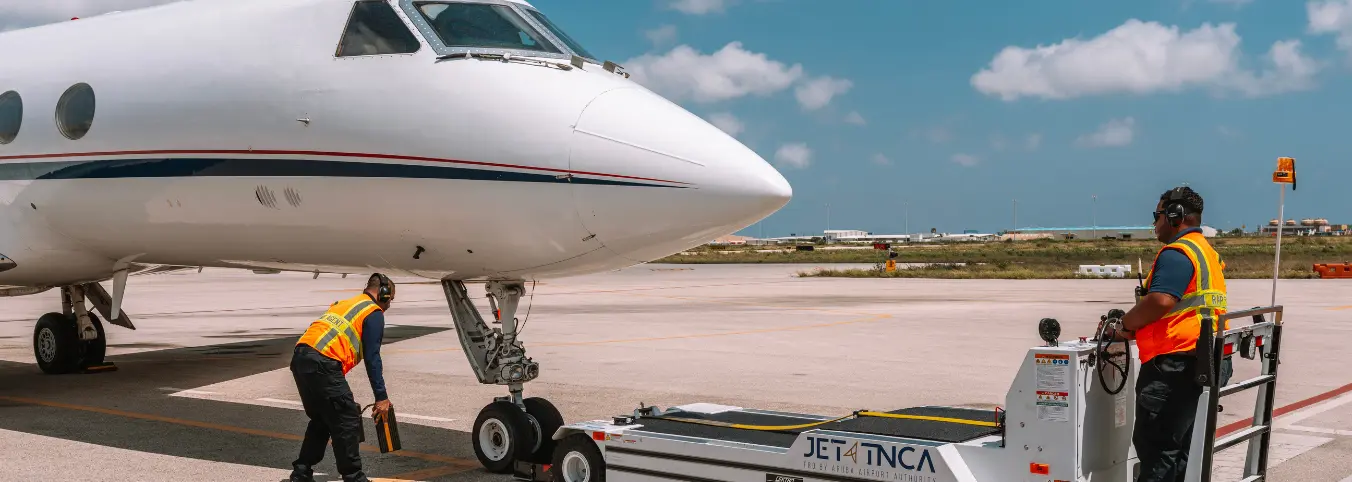Customer success story: How JET-TNCA is advancing carbon reduction and sustainable aviation with World Kinect’s expert strategy
In a hard-to-abate sector, it is critical for aviation organizations to understand their carbon footprint and the challenges and opportunities to decarbonize. Achieving carbon neutrality involves overcoming financial, technical, and operational challenges. Without a comprehensive road map to reach those goals, realizing them becomes considerably harder.
Aruba Airport Authority N.V. (AAA), manages and operates Aeropuerto Internacional Reina Beatrix (AUA Airport) on Aruba. AUA Airport is one of the busiest airports in the Caribbean region, with 26 different airlines operating into Aruba contributing to processing over 3.2 million passengers per year providing air service to 45 destinations worldwide.
The challenge
AAA’s aspiration for 2030 is for Aeropuerto Internacional Reina Beatrix to become one of the most sustainable, safe, and future-proof airports of the Latin America and Caribbean region. AAA initiated its journey to achieve Airport Carbon Accreditation (ACA) in 2018 and achieved Level 1 – Mapping in 2020 and reached Level 2 – Reduction in 2021. In 2022, AAA achieved Level 3 – Optimization which includes third party engagement in carbon reduction. AAA is advancing efforts already made by the aviation sector by incorporating a policy of integral management of its Greenhouse Gas (GHG) emissions — also known as carbon emissions — to establish a commitment and strategy for its reduction and offset.
JET-TNCA, the airport’s fixed-based operator (FBO) is committed to supporting AAA with their sustainability vision and goals. They have a goal to be THE preferred FBO in the Caribbean and achieve The National Air Transportation Association (NATA) Sustainability Standard for Aviation Companies. This is a sustainability initiative created to provide FBO’s and other aviation companies with a self-certification process to look for flexible options to reduce their carbon footprint. By achieving the Standard and conducting its carbon footprint inventory, the FBO will be aligning its sustainability goals with that of the airport.
The solution
As a member of the Air Elite® by World Fuel network and a location supplied by World Fuel, JET-TNCA was able to leverage World Fuel’s integrated sustainability division (World Kinect) to access tailored environmental insights and actionable strategies.
Through this collaboration, JET-TNCA developed a deeper understanding of its carbon footprint and identified meaningful carbon reduction opportunities.
Quantifying JET-TNCA’s environmental impact
The process began with quantifying the FBO’s environmental impact across Scopes 1 and 2 to effectively measure and manage JET-TNCA’s carbon emissions data.
JET-TNCA’s carbon footprint strategy consists of:
- Comprehensive reduction: Scopes 1 and 2
- Operational reduction: Scopes 1 and 2
- Renewable electricity strategies: Scope 2
- Focus on fuel options: Scope 1
In-person workshop
The World Kinect team stepped in with a comprehensive decarbonization strategy and conducted an in-person workshop that brought together the key stakeholders from JET-TNCA and the airport.
The four-part, two-day intensive workshop focused on the following:
- Sustainability basics, plus the regulatory and reporting frameworks that impact JET- TNCA.
- Sustainability strategies for the aviation sector, including sustainable fuels, electrification strategies, carbon offsets, and next-generation technology.
- Benchmarking JET-TNCA across the sector and key competitors.
- How to establish decarbonization roadmaps and reduction targets.
- Strategies and technologies for measurement, management, and reaching decarbonization goals available to JET-TNCA.
The impact
The results of this partnership were transformative. JET-TNCA now has a comprehensive carbon footprint inventory of its scopes 1 and 2 and a roadmap to align to the airport’s sustainability policies.
In addition, the FBO will be implementing Book and Claim to customers. In most parts of the world, sustainable aviation fuel (SAF) is still highly scarce, if available at all. Book and Claim overcomes this by letting FBO clients benefit from SAF's environmental advantages without needing the actual fuel at their location. This avoids extra costs and emissions from transporting SAF everywhere.
Finally, JET-TNCA now has a checklist and action plan for realizing its goal of achieving the NATA Sustainability Standard for Aviation Companies. In turn, this brings greater alignment with the airport following its achievement of Level 3 ACA and Green Globe certification, LEEDd Gold certification for GW 2030 Phase 1A and the advancement of its sustainability journey.
Angeline Flemming, Director Health and Sustainability:
"World Kinect's expertise has been invaluable for JET-TNCA. Their comprehensive decarbonization strategy and hands-on workshop have equipped us with the tools to understand and reduce our carbon footprint effectively. With World Kinect's support, we are now aligned with Aruba Airport Authority's sustainability goals and well on our way to achieving the NATA Green Aviation Business Tier 1 Sustainability Standard for Aviation Companies accreditation by the end of Q3 of 2025. This collaboration has truly paved the way for a more sustainable future in aviation.”
If you would like more information on decarbonization strategies and how World Kinect could help you with your sustainability commitments, reach out to our team today.
Banner image courtesy of Jet TNCA




